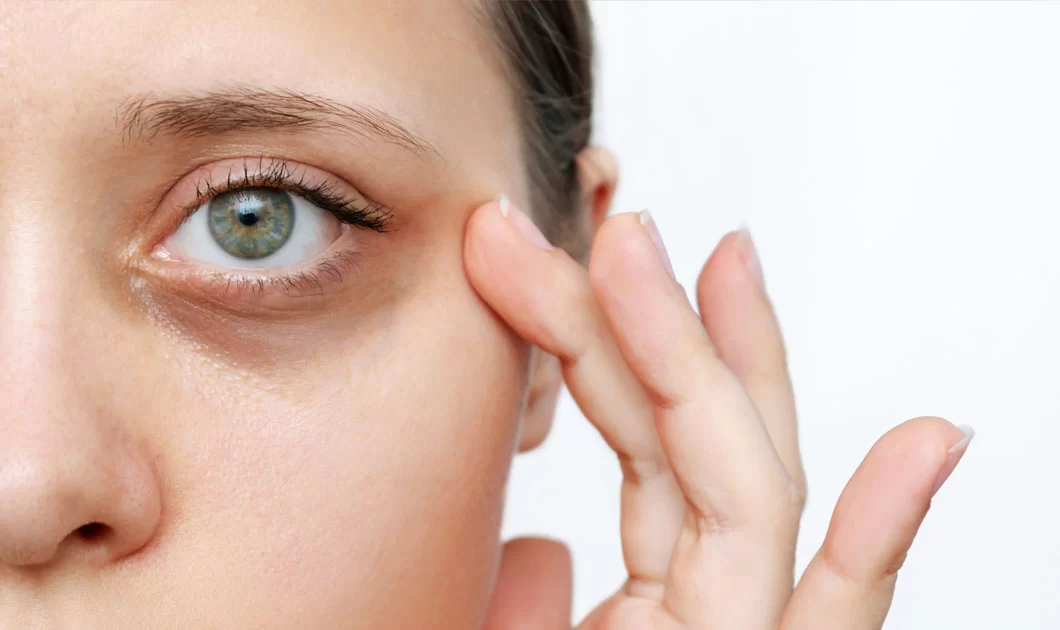Glamour Skin Studio is a dark circle treatment clinic in Surat. Get the best dermatologist and doctor for dark circle removal at an affordable cost. Book an Appointment!
Heredity (or Constitutional POH): Genes determine the amount and distribution of melanin which affects eye pigmentation.
Nutritional deficiency: Discoloration under the eyes may be caused by deficiencies in iron and Vitamin-K.
Peri-Orbital Edema: Peri-Orbital Edema, commonly known as puffiness, is a condition where fluid accumulates under the eye causing swelling. There can be various reasons for this condition including allergies, high blood pressure, medical disorders such as liver, thyroid or kidney problems, and sinus infections. This condition can also lead to post-inflammatory hyperpigmentation.
Prominent vasculature: Due to the thinner overlying skin, the underlying vasculature, particularly veins, appear more prominent, causing the eye area to look darker.
Ageing: As we get older, the collagen in our skin starts to break down, resulting in the appearance of hyperpigmentation, sagging skin, fine lines, and wrinkles. The skin under the eyes also becomes thinner, and the blood vessels become more visible, making the area under the eyes appear darker.
Tear through depression: As we age, our face undergoes several changes such as the loss of fat, thinning of the overlying skin, and the descent of the cheeks. These changes can lead to a hollowing effect under the eyes, which casts shadows and gives the appearance of dark circles.
Acanthosis Nigricans: This condition, known as acanthosis nigricans, is characterized by dark, velvety patches of skin around the eyes. It is often associated with insulin imbalances and metabolic disorders.
Other Causes: It refers to various skin conditions such as post-inflammatory hyperpigmentation, dermal melanocytosis, and pigmentary demarcation lines.
Dark circles are a common issue that affect more women than men, according to a study published in the NCBI. They are most prominent in 47.50% of individuals aged between 16 and 25. Genetics is one of the primary causes of dark circles, and if left untreated, they can become permanent. However, a comprehensive medical diagnosis followed by appropriate therapy can help in treating dark circles.

Fatigue and stress: A poor sleep cycle, environmental factors, and psychological stress can strain the muscles around the eyes, leading to periorbital hyperpigmentation. Dark circles under the eyes are not necessarily a sign of tiredness, but they are often associated with it.
Sunlight: When the skin is exposed to sunlight, it triggers the production of melanin, which results in Post-Inflammatory Hyperpigmentation (PIH).
Medication: Hormonal medication and ocular hypotensive eye drops may cause dark circles.
Alcohol/Smoking: Periorbital hyperpigmentation can be worsened by excessive smoking and alcohol consumption. Smoking affects skin’s microcirculation and can lead to dark circles.
The diagnosis of POH (Pigmented Oral Lesions with a Histopathological Correlation) requires a comprehensive approach that takes into account various factors such as medical and hereditary history, lifestyle, dietary habits, and exposure to environmental stressors. A thorough examination of the skin is also conducted to establish a proper diagnosis and prescribe effective treatment.


You can easily book an appointment online or over the phone by calling 62878 78787. Our customer care team will then schedule an appointment with a dermatologist at your preferred time and convenience.
We are committed to providing quality and effective hair treatments that meet your unique needs. Contact us today to schedule a consultation with one of our hair specialists.
Dark circles may be due to genetics, thin skin, prominent blood vessels, aging, nutritional deficiency, or underlying medical conditions. Lifestyle factors such as poor sleep, sun damage, and stress are also causative factors.
Even with adequate sleep and hydration, dark circles can still occur because of genetics, natural facial anatomy such as tear troughs, thin skin, or underlying medical conditions such as allergies or iron deficiency.
Smoking, alcohol consumption, excessive eye rubbing, poor nutrition, and unprotected sun exposure can weaken the fragile under-eye skin, causing pigmentation and shadows to become more apparent.
Although some of these natural remedies might temporarily help, there is very little scientific evidence backing up their effectiveness. Misuse can even cause irritation to sensitive under-eye skin.
Not at all. Dark circles can happen to individuals even in their teens or 20s, particularly if due to lifestyle or genetics. Early detection and proper management can prevent them from becoming worse.
Topical creams such as vitamin C, kojic acid and retinoids, chemical peels, laser therapy, micro needling, dermal fillers, and lifestyle modifications can all be effective depending on the cause.
Yes. Dr. Sheena Singh offers advanced treatments for dark circles, such as topical treatments, peels, lasers, and fillers. Get a consultation customized to your requirements by calling 62878 78787.